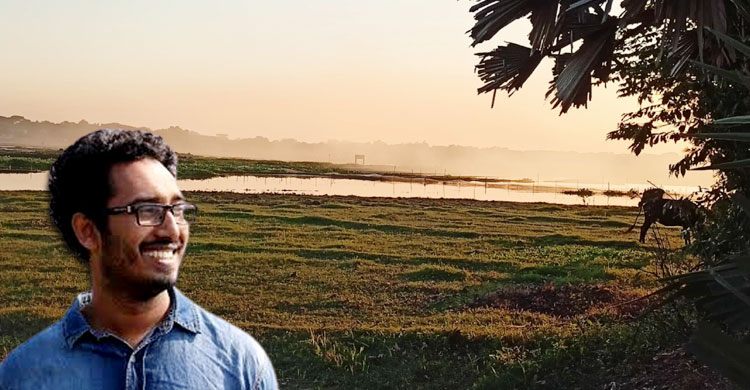In search of Jubaraj: A riverine odyssey

In the heart of Gazipur, where the rustle of nature’s whispers blends with the rhythm of flowing water, filmmaker Jubaraj Shamim has found a sanctuary. Once a bustling figure in Dhaka’s creative epicenter of Niketan, Jubaraj has traded the hum of the city for the solitude of the riverside—a stark yet deliberate choice to fuel his creative vision.
This decision comes after a career marked by bold ventures into uncharted territory, the pinnacle of which was Adim, a film that captured global attention and clinched two awards at the Moscow International Film Festival.
Now, with his feet planted firmly on the earth and his gaze fixed on the horizon, Jubaraj is crafting his next masterpiece.
The road to the riverbank
A journey to find Jubaraj begins in Dhaka but ends at Nandibari in Gazipur, where locals readily point to his home along the river. His residence, a modest three-storey building, reflects his ethos of simplicity and immersion. The ground floor is his creative hub—part editing suite, part library, and entirely alive with stories. Here, amidst stacks of books and a single sofa, he pieces together the frames of his next film.
The riverside isn’t just a retreat for Jubaraj; it’s an integral part of his storytelling. “Nature gifted me a story when I came here,” he shares, his voice imbued with gratitude. The narrative is spiritual, he says, and the cast comprises locals, bringing authenticity to the screen.
Creation in simplicity
For Jubaraj, filmmaking is not about extravagant budgets or grandiose sets. His philosophy is grounded in simplicity. A small boat tied to the riverbank serves as both his transport and an essential part of his next production. “Just like writing a poem requires only a notebook and a pen, making a film doesn’t have to be costly,” he asserts.
His journey exemplifies this belief. Back in 2018, during the making of ‘Adim’, Jubaraj overcame financial hurdles by selling shares of the film. Fifty-three individuals, including renowned filmmaker Mustafa Sarwar Farooki, now the interim government’s cultural adviser, invested in his vision. Through sheer determination, he completed the project, returned almost all the investments, and brought the film to global acclaim.
A searcher, not a filmmaker
Labels don’t sit well with Jubaraj. When asked how he identifies himself, he responds, “I am a searcher. I express my thoughts through films, much like Rumi or Ghalib did through poetry. I’m always evolving.”
This constant evolution is evident in his work. After Adim, he completed two more films, Atal and Hajat, both awaiting release. He views these projects not as mere productions but as extensions of his journey of self-discovery.
Life among the margins
The director’s choice to live and work among nature and marginalised communities stems from a belief that true art emerges from raw, unfiltered experiences. “An AC room in Dhaka's Niketan doesn’t attract me. To create real art, you need to be among people and nature,” he explains.
His films reflect this philosophy. Whether portraying the struggles of slum dwellers or capturing the serene yet tumultuous relationship between man and nature, Jubaraj’s work resonates with authenticity.
The sunset scene
As the day ends, we sit by the river, the western sky ablaze with the hues of a setting sun. Jubaraj pauses, his contemplative gaze fixed on the horizon. “I’ve seen countless sunsets here,” he says. “But today’s feels different—like it’s telling a story.”
That story, like the man himself, is one of transformation. It’s the journey of an artist who seeks to redefine filmmaking not through grandeur but through simplicity, connection, and an unrelenting hunger for meaning.
Jubaraj Shamim isn’t just a filmmaker. He is a seeker of stories—his own and the world’s—and the riverbank is where his search continues.

